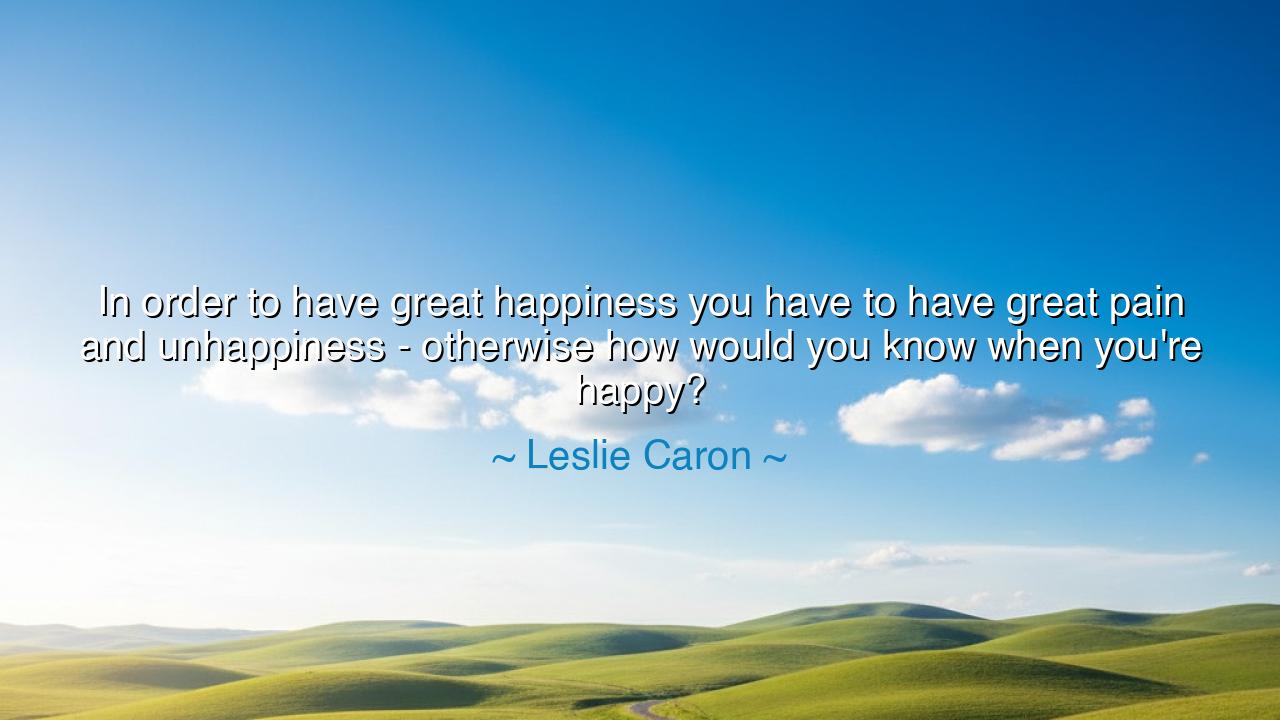
In order to have great happiness you have to have great pain and
In order to have great happiness you have to have great pain and unhappiness - otherwise how would you know when you're happy?






“In order to have great happiness you have to have great pain and unhappiness—otherwise how would you know when you’re happy?” Thus spoke Leslie Caron, the graceful dancer and actress whose life on the stage and in the world taught her not only the rhythm of movement, but the rhythm of the heart. In this simple yet profound truth, she unveils one of the oldest and deepest paradoxes of existence—that joy and sorrow are not opposites, but companions, each giving meaning to the other. Her words remind us that life’s beauty does not lie in unbroken serenity, but in the harmony that rises from contrast: the darkness that teaches us to value light, the ache that makes peace so sweet, the loss that gives love its depth.
Caron’s wisdom was born not in comfort, but through the trials of a life fully lived. Rising from the devastation of postwar Europe, she danced her way into the golden age of cinema, yet even amidst fame and applause, she tasted loneliness, heartbreak, and uncertainty. Through it all, she came to see that happiness cannot be permanent, nor should it be. To demand constant joy is to rob it of meaning. It is through the valleys that we come to love the peaks; through the storm that we learn the worth of calm. Her words echo the wisdom of the ancients, who taught that the human heart, like the seasons, must endure winter to know the glory of spring.
For indeed, pain and happiness are not enemies—they are two halves of the same truth. The one who has never wept cannot truly understand laughter; the one who has never lost cannot cherish what he has. Even the gods of old, in the myths of many nations, were not exempt from sorrow. The Greek poets sang that even Zeus, the king of heaven, wept for mortal love, and that only through suffering did heroes attain immortality. The ancients knew that suffering carves the vessel of the soul deeper, allowing it to hold more joy when joy at last returns. To live without sorrow is to live without depth; to feel deeply is to live fully.
Consider the life of Helen Keller, who was plunged into darkness and silence as a child, yet emerged to see and speak to the world with a vision clearer than most who could see. She once wrote, “We could never learn to be brave and patient if there were only joy in the world.” Keller’s happiness—her profound gratitude for life, her joy in learning, her wonder at the simplest sensations—was born directly from her pain and struggle. She knew, as Leslie Caron later affirmed, that without the shadow of hardship, happiness would be weightless, without contrast or shape. True happiness, then, is not the absence of pain—it is the transformation of pain into understanding.
This teaching, though gentle, is heroic in its demand. It calls us not to flee from suffering, but to embrace it as the forge of wisdom. The one who endures pain without despair becomes like tempered steel, strong and radiant. To live is to be vulnerable; to love is to risk loss; to strive is to invite failure. But from these experiences grows compassion, humility, and resilience. The heart that has known great sorrow learns tenderness; the one who has stumbled and risen learns courage. Thus, happiness is not given—it is earned through endurance, through the patient acceptance of life’s full spectrum.
Caron’s insight also carries a warning against illusion. Many chase a life of endless pleasure, believing that happiness is found in the avoidance of pain. Yet such a life, untouched by struggle, becomes shallow and fragile. It is the contrast between sorrow and joy that gives texture to the soul. Just as the eye sees light only because it knows shadow, so the heart feels happiness only because it has endured grief. The wise, therefore, do not curse their trials—they give thanks for them. For every sorrow survived makes the next joy more radiant, and every hardship overcome deepens one’s capacity for peace.
So let this be the lesson passed down: do not fear unhappiness, for it is the teacher of joy. When pain comes, do not close your heart to it—let it pass through you and shape you. When sorrow strikes, remember that every wound is a preparation for future light. And when happiness returns, savor it fully, knowing how fragile and precious it truly is. For as Leslie Caron teaches, it is only by tasting the bitterness of loss that we can truly drink the sweetness of life. Pain refines the heart, and from its ashes rises gratitude—and gratitude, in its purest form, is the essence of happiness itself.






AAdministratorAdministrator
Welcome, honored guests. Please leave a comment, we will respond soon